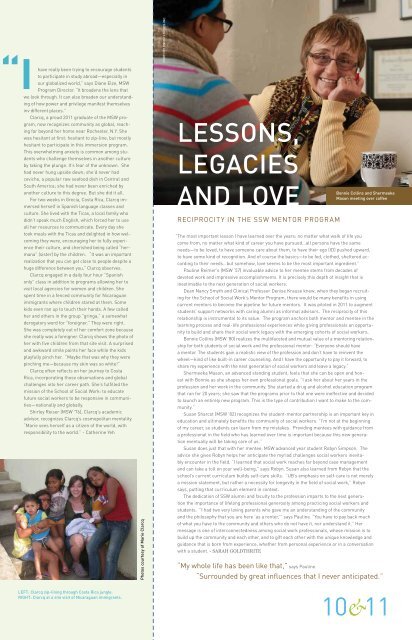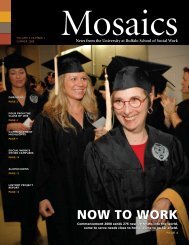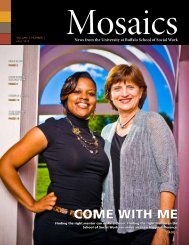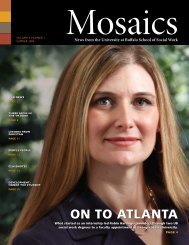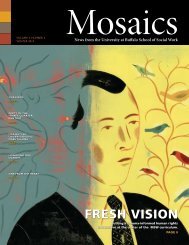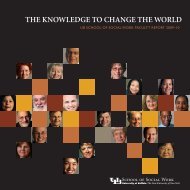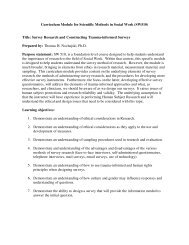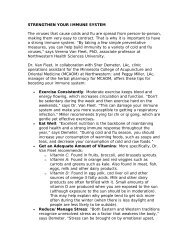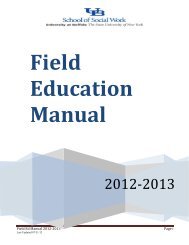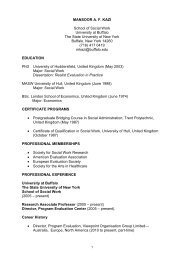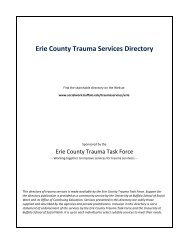Spring 2013 issue - UB School of Social Work - University at Buffalo
Spring 2013 issue - UB School of Social Work - University at Buffalo
Spring 2013 issue - UB School of Social Work - University at Buffalo
Create successful ePaper yourself
Turn your PDF publications into a flip-book with our unique Google optimized e-Paper software.
Photo by Onion studios INC.<br />
really been trying to encourage students<br />
to particip<strong>at</strong>e in study abroad—especially in<br />
our globalized world,” says Diane Elze, MSW<br />
“Ihave<br />
Program Director. “It broadens the lens th<strong>at</strong><br />
we look through. It can also broaden our understanding<br />
<strong>of</strong> how power and privilege manifest themselves<br />
inv different places.”<br />
Clarcq, a proud 2011 gradu<strong>at</strong>e <strong>of</strong> the MSW program,<br />
now recognizes community as global, reaching<br />
far beyond her home near Rochester, N.Y. She<br />
was hesitant <strong>at</strong> first: hesitant to zip-line, but mostly<br />
hesitant to particip<strong>at</strong>e in this immersion program.<br />
This overwhelming anxiety is common among students<br />
who challenge themselves in another culture<br />
by taking the plunge. It’s fear <strong>of</strong> the unknown. She<br />
had never hung upside down; she’d never had<br />
ceviche, a popular raw seafood dish in Central and<br />
South America; she had never been enriched by<br />
another culture to this degree. But she did it all.<br />
For two weeks in Grecia, Costa Rica, Clarcq immersed<br />
herself in Spanish language classes and<br />
culture. She lived with the Ticas, a local family who<br />
didn’t speak much English, which forced her to use<br />
all her resources to communic<strong>at</strong>e. Every day she<br />
took meals with the Ticas and delighted in how welcoming<br />
they were, encouraging her to fully experience<br />
their culture, and cherished being called “hermana”<br />
(sister) by the children. “It was an important<br />
realiz<strong>at</strong>ion th<strong>at</strong> you can get close to people despite a<br />
huge difference between you,” Clarcq observes.<br />
Clarcq engaged in a daily four hour “Spanish<br />
only” class in addition to programs allowing her to<br />
visit local agencies for women and children. She<br />
spent time in a fenced community for Nicaraguan<br />
immigrants where children stared <strong>at</strong> them. Some<br />
kids even ran up to touch their hands. A few called<br />
her and others in the group “gringa,” a somewh<strong>at</strong><br />
derog<strong>at</strong>ory word for “foreigner.” They were right.<br />
She was completely out <strong>of</strong> her comfort zone because<br />
she really was a foreigner. Clarcq shows the photo <strong>of</strong><br />
her with five children from th<strong>at</strong> site visit. A surprised<br />
and awkward smile paints her face while the kids<br />
playfully pinch her. “Maybe th<strong>at</strong> was why they were<br />
pinching me—because my skin was so white!”<br />
Clarcq <strong>of</strong>ten reflects on her journey to Costa<br />
Rica, incorpor<strong>at</strong>ing those observ<strong>at</strong>ions and global<br />
challenges into her career p<strong>at</strong>h. She’s fulfilled the<br />
mission <strong>of</strong> the <strong>School</strong> <strong>of</strong> <strong>Social</strong> <strong>Work</strong>: to educ<strong>at</strong>e<br />
future social workers to be responsive in communities—n<strong>at</strong>ionally<br />
and globally.<br />
Shirley Reiser (MSW ’76), Clarcq’s academic<br />
advisor, recognizes Clarcq’s cosmopolitan mentality.<br />
“Marie sees herself as a citizen <strong>of</strong> the world, with<br />
responsibility to the world.” - C<strong>at</strong>herine Yeh<br />
Left: Clarcq zip-lining through Costa Rica jungle.<br />
Right: Clarcq <strong>at</strong> a site visit <strong>of</strong> Nicaraguan immigrants.<br />
Photos courtesy <strong>of</strong> Marie Clarcq<br />
Lessons,<br />
legacies<br />
and love<br />
Reciprocity in the SSW Mentor PrograM<br />
Bonnie Collins and Shermeeka<br />
Mason meeting over c<strong>of</strong>fee<br />
“The most important lesson I have learned over the years: no m<strong>at</strong>ter wh<strong>at</strong> walk <strong>of</strong> life you<br />
come from, no m<strong>at</strong>ter wh<strong>at</strong> kind <strong>of</strong> career you have pursued…all persons have the same<br />
needs—to be loved, to have someone care about them, to have their ego (ID) pushed upward,<br />
to have some kind <strong>of</strong> recognition. And <strong>of</strong> course the basics—to be fed, clothed, sheltered according<br />
to their needs…but somehow, love seems to be the most important ingredient.”<br />
Pauline Reimer’s (MSW ‘57) invaluable advice to her mentee stems from decades <strong>of</strong><br />
devoted work and impressive accomplishments. It is precisely this depth <strong>of</strong> insight th<strong>at</strong> is<br />
inestimable to the next gener<strong>at</strong>ion <strong>of</strong> social workers.<br />
Dean Nancy Smyth and Clinical Pr<strong>of</strong>essor Denise Krause knew, when they began recruiting<br />
for the <strong>School</strong> <strong>of</strong> <strong>Social</strong> <strong>Work</strong>’s Mentor Program, there would be many benefits in using<br />
current mentors to become the pipeline for future mentors. It was piloted in 2011 to augment<br />
students’ support networks with caring alumni as informal advisors. The reciprocity <strong>of</strong> this<br />
rel<strong>at</strong>ionship is instrumental to its value. The program anchors both mentor and mentee in the<br />
learning process and real-life pr<strong>of</strong>essional experiences while giving pr<strong>of</strong>essionals an opportunity<br />
to build and share their social work legacy with the emerging cohorts <strong>of</strong> social workers.<br />
Bonnie Collins (MSW ’80) realizes the multifaceted and mutual value <strong>of</strong> a mentoring rel<strong>at</strong>ionship<br />
for both students <strong>of</strong> social work and the pr<strong>of</strong>essional mentor: “Everyone should have<br />
a mentor. The students gain a realistic view <strong>of</strong> the pr<strong>of</strong>ession and don’t have to reinvent the<br />
wheel—kind <strong>of</strong> like built-in career counseling. And I have the opportunity to pay it forward, to<br />
share my experience with the next gener<strong>at</strong>ion <strong>of</strong> social workers and leave a legacy.”<br />
Shermeeka Mason, an advanced standing student, feels th<strong>at</strong> she can be open and honest<br />
with Bonnie as she shapes her own pr<strong>of</strong>essional goals. “I ask her about her years in the<br />
pr<strong>of</strong>ession and her work in the community. She started a drug and alcohol educ<strong>at</strong>ion program<br />
th<strong>at</strong> ran for 20 years; she saw th<strong>at</strong> the programs prior to th<strong>at</strong> one were ineffective and decided<br />
to launch an entirely new program. This is the type <strong>of</strong> contribution I want to make to the community.”<br />
Susan Sharcot (MSW ’82) recognizes the student-mentor partnership is an important key in<br />
educ<strong>at</strong>ion and ultim<strong>at</strong>ely benefits the community <strong>of</strong> social workers. “I’m not <strong>at</strong> the beginning<br />
<strong>of</strong> my career, so students can learn from my mistakes. Providing mentees with guidance from<br />
a pr<strong>of</strong>essional in the field who has learned over time is important because this new gener<strong>at</strong>ion<br />
eventually will be taking care <strong>of</strong> us.”<br />
Susan does just th<strong>at</strong> with her mentee, MSW advanced year student Robyn Simpson. The<br />
advice she gives Robyn helps her anticip<strong>at</strong>e the myriad challenges social workers inevitably<br />
encounter in the field. “I learned th<strong>at</strong> social work reaches far beyond case management<br />
and can take a toll on your well-being,” says Robyn. Susan also learned from Robyn th<strong>at</strong> the<br />
school’s current curriculum builds self-care skills. “<strong>UB</strong>’s emphasis on self-care is not merely<br />
a mission st<strong>at</strong>ement, but r<strong>at</strong>her a necessity for longevity in the field <strong>of</strong> social work,” Robyn<br />
says, putting th<strong>at</strong> curriculum element in context.<br />
The dedic<strong>at</strong>ion <strong>of</strong> SSW alumni and faculty to the pr<strong>of</strong>ession imparts to the next gener<strong>at</strong>ion<br />
the importance <strong>of</strong> lifelong pr<strong>of</strong>essional generosity among practicing social workers and<br />
students. “I had two very loving parents who gave me an understanding <strong>of</strong> the community<br />
and the philosophy th<strong>at</strong> you are here ‘as a renter,’” says Pauline. “You have to pay back much<br />
<strong>of</strong> wh<strong>at</strong> you have to the community and others who do not have it, nor understand it.” Her<br />
message is one <strong>of</strong> interconnectedness among social work pr<strong>of</strong>essionals, whose mission is to<br />
build up the community and each other, and to gift each other with the unique knowledge and<br />
guidance th<strong>at</strong> is born from experience, whether from personal experience or in a convers<strong>at</strong>ion<br />
with a student. - Sarah Goldthrite<br />
“My whole life has been like th<strong>at</strong>,” says Pauline.<br />
“Surrounded by gre<strong>at</strong> influences th<strong>at</strong> I never anticip<strong>at</strong>ed.”<br />
10&11


